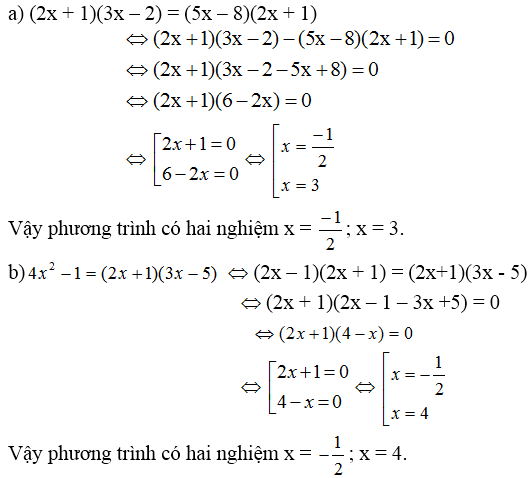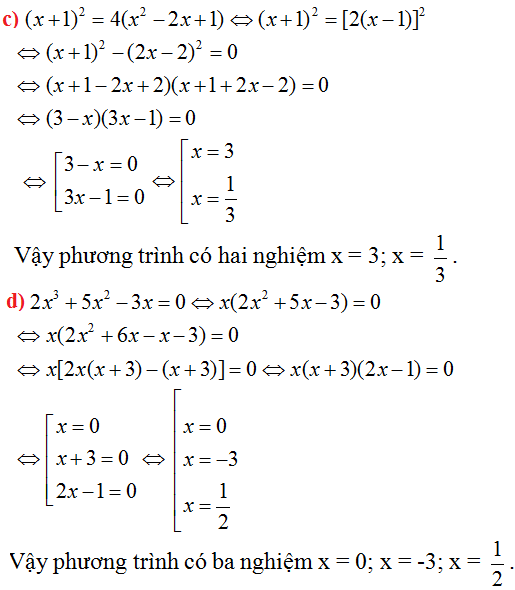
Hãy nhập câu hỏi của bạn vào đây, nếu là tài khoản VIP, bạn sẽ được ưu tiên trả lời.


a)(2x+1)(3x-2)=(5x-8)(2x+1)
⇔(2x+1)(3x-2)-(5x-8)(2x+1)=0
⇔(2x+1)(3x-2-5x+8)=0
⇔(2x+1)(-2x+6)=0
⇔2x+1=0 hoặc -2x+6=0
1.2x+1=0⇔2x=-1⇔x=-1/2
2.-2x+6=0⇔-2x=-6⇔x=3
phương trình có 2 nghiệm x=-1/2 và x=3

a, Xét x=0 không phải nghiệm pt chia 2 vế cho x2 , đặt t= x+1/x từ đó suy ra phương trình ẩn t, giải ra ta được các phương trình ẩn x rồi ra x.
b, Tách đa thức thành tích của đơn thức (x+1) và 1 đa thức bậc 4 rồi làm như câu a,.
\(2x^4+3x^3-x^2+3x+2=0\)
\(\Leftrightarrow2x^4+4x^3-x^3-2x^2+x^2+2x+x+2=0\)
\(\Leftrightarrow2x^3.\left(x+2\right)-x^2.\left(x+2\right)+x.\left(x+2\right)+\left(x+2\right)=0\)
\(\Leftrightarrow\left(x+2\right).\left(2x^3-x^2+x+1\right)=0\)
\(\Leftrightarrow\left(x+2\right).\left(2x^3+x^2-2x^2-x+2x+1\right)=0\)
\(\Leftrightarrow\left(x+2\right).\left(2x+1\right).\left(x^2-x+1\right)=0\)
\(\Leftrightarrow\orbr{\begin{cases}x+2=0\\2x+1=0\end{cases}\Rightarrow\orbr{\begin{cases}x=-2\\x=-\frac{1}{2}\end{cases}}}\)
\(\text{Vì }x^2-x+1=x^2-x+\frac{1}{4}+\frac{3}{4}=\left(x-\frac{1}{2}\right)^2+\frac{3}{4}\ge\frac{3}{4}\)
Vậy phương trình có nghiệm \(S=\left\{-2,-\frac{1}{2}\right\}\)

a) \(x^3+x^2+2x-16\ge0\)
\(\Leftrightarrow x^3-2x^2+3x^2-6x+8x-16\ge0\)
\(\Leftrightarrow\left(x-2\right)\left(x^2+3x+8\right)\ge0\)
Mà \(x^2+3x+8>x^2+3x+2,25=\left(x+1,5\right)^2\ge0\)
Cho nên \(x-2\ge0\)
\(\Leftrightarrow x\ge2\)
a,x^3-2x^2+3x^2-6x+8x-16>=0
(x^2+3x+8)(x-2)>=0
x^2+3x+8>0
=> để lớn hơn hoac bang 0 thì x-2 phải>=0
=>x>=2
b,hình như là vô nghiệm ko chắc chắn lắm

\(2x-2=8-3x\)
\(\Leftrightarrow\)\(2x+3x=8+2\)
\(\Leftrightarrow\)\(5x=10\)
\(\Leftrightarrow\)\(x=2\)
Vậy...
\(x^2-3x+1=x+x^2\)
\(\Leftrightarrow\)\(x^2-3x-x-x^2=-1\)
\(\Leftrightarrow\)\(-4x=-1\)
\(\Leftrightarrow\)\(x=\frac{1}{4}\)
Vậy...
mấy cái này bấm máy tính là đc òi. giải mất thời gian lắm :))

b)\(3x^3+6x^2-75x-150=0\Leftrightarrow3\left(x^3+2x^2-25x-50\right)=0\Leftrightarrow x^3+2x^2-25x-50=0\)
<=>\(x^2\left(x+2\right)-25\left(x+2\right)=0\Leftrightarrow\left(x^2-25\right)\left(x+2\right)=0\Leftrightarrow\left(x-5\right)\left(x+5\right)\left(x+2\right)=0\)
<=>x-5=0 hoặc x+5=0 hoặc x+2=0<=>x=5 hoặc x=-5 hoặc x=-2
c)\(2x^5-3x^4+6x^3-8x^2+3=0\Leftrightarrow2x^5+x^4-4x^4-2x^3+8x^3+4x^2-12x^2+3=0\)
<=>\(x^4\left(2x+1\right)-2x^3\left(2x+1\right)+4x^2\left(2x+1\right)-3\left(4x^2-1\right)=0\)
<=>\(x^4\left(2x+1\right)-2x^3\left(2x+1\right)+4x^2\left(2x+1\right)-3\left(2x-1\right)\left(2x+1\right)=0\)
<=>\(\left(2x+1\right)\left(x^4-2x^3+4x^2-6x+3\right)=0\)
<=>\(\left(2x+1\right)\left(x^4-2x^3+x^2+3x^2-6x+3\right)=0\)
<=>\(\left(2x+1\right)\left[x^2\left(x^2-2x+1\right)+3\left(x^2-2x+1\right)\right]=0\)
<=>\(\left(2x+1\right)\left(x^2+3\right)\left(x^2-2x+1\right)=0\Leftrightarrow\left(2x+1\right)\left(x^2+3\right)\left(x-1\right)^2=0\)
Vì \(x^2\ge0\Rightarrow x^2+3\ge3>0\Rightarrow\orbr{\begin{cases}2x+1=0\\\left(x-1\right)^2=0\end{cases}}\Rightarrow\orbr{\begin{cases}x=-\frac{1}{2}\\x=1\end{cases}}\)
a) 2x3 - x2 - 8x + 4 = 0
x2.(2x - 1) - 4.(2x - 1) = 0
(x2 - 4)(2x - 1) = 0
\(\Rightarrow\orbr{\begin{cases}x^2-4=0\\2x-1=0\end{cases}}\Rightarrow\orbr{\begin{cases}x^2=4\\x=\frac{1}{2}\end{cases}}\)
Với x2 = 4
=> x = 2 hoặc x = -2
=> x = {-2 ; 2 ; \(\frac{1}{2}\))

1) 2x4 - 9x3 + 14x2 - 9x + 2 = 0
<=> (2x4 - 4x3) - (5x3 - 10x2) + (4x2 - 8x) - (x - 2) = 0
<=> 2x3(x - 2) - 5x2(x - 2) + 4x(x - 2) - (x - 2) = 0
<=> (2x3 - 5x2 + 4x - 1)(x - 2) = 0
<=> [(2x3 - 2x2) - (3x2 - 3x) + (x - 1)](x - 2) = 0
<=> [2x2(x - 1) - 3x(x - 1) + (x - 1)](x - 2) = 0
<=> (2x2 - 2x - x + 1)(x - 1)(x - 2) = 0
<=> (2x - 1)(x - 1)2(x - 2) = 0
<=> 2x - 1=0
hoặc x - 1 = 0
hoặc x - 2 = 0
<=> x = 1/2
hoặc x = 1
hoặc x = 2
Vậy S = {1/2; 1; 2}


pt <=>(x^5+x^4)+(x^4+x^3)+(2x^3+2x^2)+(x^1+x)+(x+1) =0
<=> (x+1).(x^4+x^3+2x^2+x+1)=0
<=>(x+1).[(x^4+x^3+x^2)+(x^2+x+1)] =0
<=>(x+1).(x^2+x+1).(x^2+1)=0
<=> x+1 = 0 ( vì x^2+x+1 và x^2+1 đều > 0)
<=> x= -1
Vậy pt có tập nghiệm x=-1